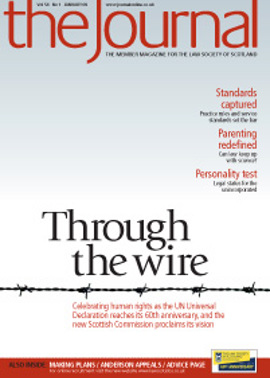Regulator on a roll

The Office of the Scottish Charity Regulator (OSCR) has published its second set of key findings from the rolling review of all Scottish charities, triggering a rash of headlines focused on its consideration of the status of independent schools and the issue of charging fees. However, for the vast majority of Scotland’s 23,500 registered charities, OSCR’s decisions to date reveal a number of other important lessons to be taken on board ahead of their own rolling review examination.
In what will be essential reading for most charities, OSCR’s decisions tackle the definition of “charitable”, the possibility of a charity’s stated purposes having been overtaken by the evolution of its activities, and how charities can effectively communicate the public benefit they provide to the wider community.
While some charities may be disappointed with the outcome of the review – four independent schools “failed” the test – or the directions issued to a number of charities, the approach OSCR has taken in those cases once again underlines its desire to be seen as a proportionate regulator.
When is a charity not a charity?
When considering charitable status, the first thing that must be examined is whether the charity’s constitution contains charitable purposes and disables the charity from applying funds for non-charitable activities. The rolling review has emphasised this issue, which, although technical, lies at the heart of being a charity.
It is critical that a Scottish registered charity has purposes which are charitable under Scots law. The extent of those purposes must be referenced to the Charities and Trustee Investment (Scotland) Act 2005. However, it is common for charities established prior to 2006 to make reference to their purposes correlating with those recognised under revenue law – and, often, particular parts of income and corporation tax law. While such a formulation is commonplace, it will not satisfy OSCR’s requirements on defining “charitable” in terms of Scots law. The effect is that a charity’s constitution which makes reference to it only having charitable purposes – and only being permitted to carry out charitable activities – but which defines “charitable” in terms of tax law, will not be sufficient to retain Scottish charitable status. Such charities should consider making the necessary amendments ahead of the rolling review.
OSCR and HM Revenue & Customs recognised the potential difficulties associated with defining “charitable” and issued joint guidance. Such guidance is welcome and confirms that reference should be made to the 2005 Act and “the Taxes Acts”. However, it would have been beneficial for the tax law element of the joint definition to clarify what is specifically included under the phrase “the Taxes Acts”.
In the most recent phase of the rolling review, it has also been underlined that, notwithstanding definitional issues, a purpose may simply be deemed not charitable. One of the charities examined contained the purpose of “the promotion of trade and industry”, a definition agreed with HMRC prior to OSCR taking over responsibility for these matters, but which OSCR has subsequently decided is not a charitable purpose.
This example highlights the need for charities to keep under review their charitable purposes, both from the perspective of changing legislation and changes in their activities. A charity’s activities and stated purposes must both be charitable and complement each other. The 2005 Act provides a wide suite of charitable purposes to select from, and it is likely that any outmoded purposes can be reformulated into a contemporary charitable purpose, as long as the underlying activities remain charitable.
Demonstrating public benefit
While ensuring that a charity has properly formulated charitable purposes is an important element of the charity test, it is the need to provide public benefit without unduly restrictive conditions which has been the focus of attention, particularly in the media. There is much more to the rolling review than the interaction of public benefit with, for example, charging for services, but the need for all charities to demonstrate public benefit must still be acknowledged. It is crucial that charities take time to prepare an annual report which accurately and properly reflects the charity’s current activities. This will be a first port of call for both the public and OSCR, in considering whether the charity provides public benefit. The annual report and other public documents should make clear the ways in which the public can benefit from the charity and how individuals can benefit from facilitated access if required.
The future
OSCR has announced that the results of future rolling review decisions will not be publicised in the same way as these early decisions. This should mean less attention on headline-grabbing cases and a greater emphasis on the fundamental questions of whether a charity’s documents are up to date and appropriate.
In this issue
- Public law in Scotland
- Harmony in conflict management
- Tapping Reeve and his legacy
- Busy times at 60
- Living wills - why?
- Forward by the rights
- A cornerstone of rights
- Welcome for rejections takeup
- Sins of omission
- A time to buy?
- Parenthood reborn
- Persons unknown
- Front of the class
- Setting the standards
- Client service: the standards
- Judicial appointments: how you can take part
- ABS - the next phase
- Third parties and premature complaints
- Planning to perform
- Manual for the mind
- Computing on tap - or money down the drain?
- When resolution is not enough
- Ask Ash
- Making up lost time?
- Don't get caught short by transfer traps
- Collaboration: a new dimension
- Packed and ready
- Regulator on a roll
- Scottish Solicitors' Discipline Tribunal
- Website review
- Book reviews
- Medicines: the wrong cure
- Fraud alert! (and a cautionary tale)






